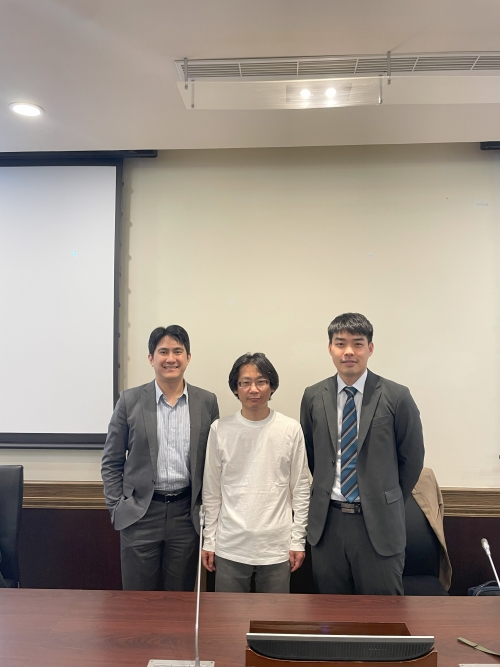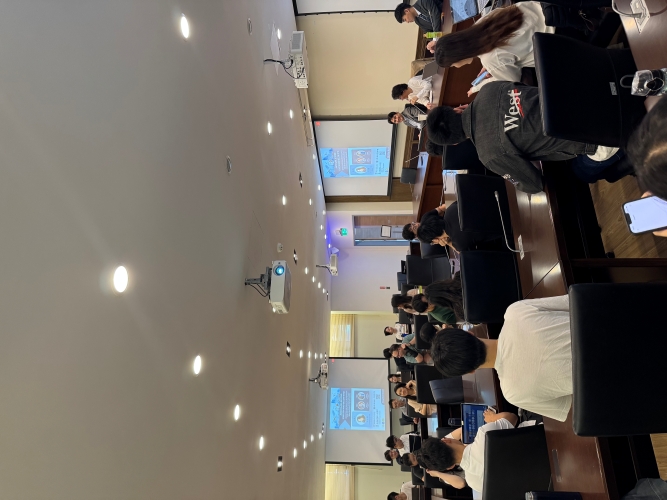The Asian Center for WTO and International Health Law and Policy (ACWH) hosted a seminar titled “Above Law, Beyond English and Below WTO: Expertise and Skills to be Equipped for the Next Generation Trade Practitioners and Diplomats” at the College of Law, National Taiwan University on May 2, 2025.

Dr. Chien-Huei Wu, who currently serves as the Deputy Permanent Representative at the Permanent Mission of the Republic of China (Taiwan) to the World Trade Organization (WTO), was the keynote speaker of the seminar.
The seminar began with opening remarks by Associate Professor Yueh-Ping (Alex) Yang, Director of the ACWH. Professor Yang first expressed his appreciation to Dr. Wu for taking the time to speak at the event and introduced his extensive diplomatic and academic background. He also encouraged participants to actively engage and ask questions to gain deeper insights into the current international landscape.
Departing from the traditional one-way lecture, Dr. Wu opted for a dynamic 30-minute Q&A session with participants. The 68 questions he prepared covered a wide range of geographic regions—including Taiwan, the United States, Europe, East Asia, and the Middle East—and spanned a historical timeline from the Treaty of Westphalia in the 17th century and the Treaty of Shimonoseki in the late 19th century to World War II and contemporary international affairs.
Through these questions, Dr. Wu guided participants to reflect on the interplay and complementarity between international economic law, public international law, and international political economy. He stressed that international law cannot be discussed in isolation from history and international relations.

Following the Q&A session, Dr. Wu drew on his interactions with diplomats worldwide to deliver a key message of this seminar, that is: possessing professional knowledge and English fluency are merely the starting point for becoming a competent diplomat. What truly sets outstanding diplomats apart is a deep understanding of diverse cultures, profound knowledge of history, and strong communication skills. He emphasized the importance of actively developing both geopolitical and historical awareness. The former involves proactively learning about the social and cultural contexts of regions around the globe, while the latter refers to recognizing key historical events and understanding their interconnections with the evolution of international governance.
In closing, Dr. Wu recommended participants to learn a second foreign language, such as Spanish, to access diverse interpretations of historical events and broaden their opportunities for engagement with the international community. He strongly encouraged participants to actively apply for programs or internship offered by international organizations and institutions, such as the WTO’s Young Professionals Programme; and the Penglai Scholarships funded by the Mission, to study at World Trade Institute.
Discussant Mao-Wei Lo, Assistant Professor at the College of Law, National Taiwan University, remarked that Dr. Wu’s Q&A format skillfully connected historical events with the evolution of international legal order, helping participants understand how international law has evolved within specific historical contexts. He emphasized that understanding the underlying context of issues is essential for resonating with individuals from different cultural backgrounds.
Echoing Dr. Wu’s remarks, Professor Lo drew on Francis Fukuyama’s book “The End of History”, the origins and recent challenges of the interdependence theory in international relations, and the impact of China’s accession to the WTO on global economic governance and geopolitical landscape, prompting participants to reflect on the limitations of economic globalization. Finally, Professor Lo noted that while many people may feel pessimistic about the future of the WTO and international economic law at large, Taiwan, given its significance in the global supply chain and economic activities, may be able to substantially influence the normative processes of contemporary global economic governance. Therefore, he encouraged participants to continue engaging in both the academic and practical realms of international law.
The ACWH sincerely thanks Dr. Chien-Huei Wu for his insightful and thought-provoking speech.